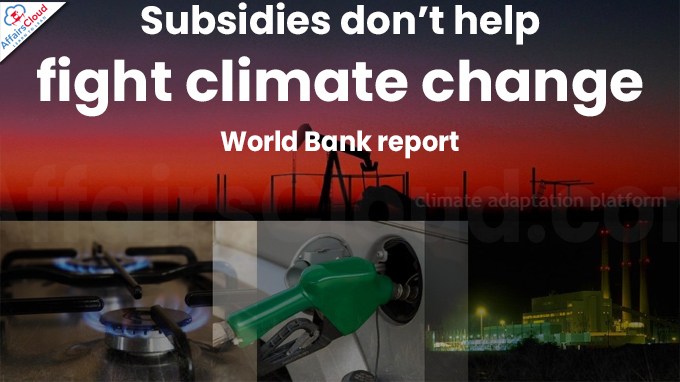 According to the report ‘Detox Development Repurposing Environmentally Harmful Subsidies’ , released by the World Bank (WB), subsidies for three assets of fossil fuels, agriculture, and fisheries did not address the climate change instead being the cause for the degradation of these assets and harming people, the planet, and economies.
According to the report ‘Detox Development Repurposing Environmentally Harmful Subsidies’ , released by the World Bank (WB), subsidies for three assets of fossil fuels, agriculture, and fisheries did not address the climate change instead being the cause for the degradation of these assets and harming people, the planet, and economies.
- The subsidies for the three assets exceed USD 7 trillion per year or about 8% of global Gross Domestic Product (GDP).
- These subsidies include both explicit subsidies,which are direct public expenditures totaling about USD 1.25 trillion and implicit subsidies, which measure the societal impacts of externalities and amount to more than USD 6 trillion.
Key Analysis of the Report:
i.The report examines how subsidy reform could help safeguard the world’s foundational natural assets of clean air, land, and oceans.
ii.As per the report, subsidy reform could reduce air pollution and save up to 360,000 lives by 2035 in 25 high-pollution, high-subsidy countries.
iii.Fossil fuel:
- Fossil fuel usage which is incentivized by vast subsidies is being the main cause for the 7 million premature deaths each year due to air pollution.
- About 94% of the world’s population is exposed to unsafe particulate matter (PM2.5) concentrations.
iv.Agriculture:
- Agricultural subsidies are responsible for the loss of 2.2 million hectares of forest per year, equivalent to 14% of global deforestation.
- Subsidy-driven deforestation causes the spread of vector-transmitted diseases including 3.8 million additional cases of malaria each year, with an economic impact of up to USD 19 billion per year.
- In India, 1.36 billion people (99% of the population) are exposed to unsafe PM2.5 concentrations (that is, over 5 μg/m3), of which 1.33 billion (96%) face hazardous levels (over 35 μg/m3).
v.Fisheries:
- More than 34% of fisheries are overfished, and this situation is exacerbated by open-access regimes and capacity increasing subsidies.
- Fisheries subsidies, which exceed USD 35 billion each year, are a key driver of dwindling fish stocks, oversized fishing fleets, and falling profitability.
- Inefficient subsidy usage is responsible for up to 17% of all nitrogen pollution in water in the past 30 years, which has large enough health impacts on reducing labor productivity by up to 3.5%.
Other Highlights of the Report:
i.Countries around the world actively paid about USD 577 billion in 2021 to artificially lower the price of polluting fuels such as oil, gas, and coal.
ii.Poor air quality is responsible for approximately 1 in 5 deaths globally. A significant number of these deaths can be attributed to fossil fuel subsidies.
iii.Agriculture is the largest user of land worldwide, feeding the world and employing 1 billion people, including 78% of the world’s poor.
iv.Oceans, which support the world’s fisheries and supply about 3 billion people with almost 20 percent of their intake of animal protein, are in a collective state of crisis.
About World Bank(WB):
World Bank Group President – Ajay Banga
Headquarters – Washington, DC, USA
Establishment – 1944




